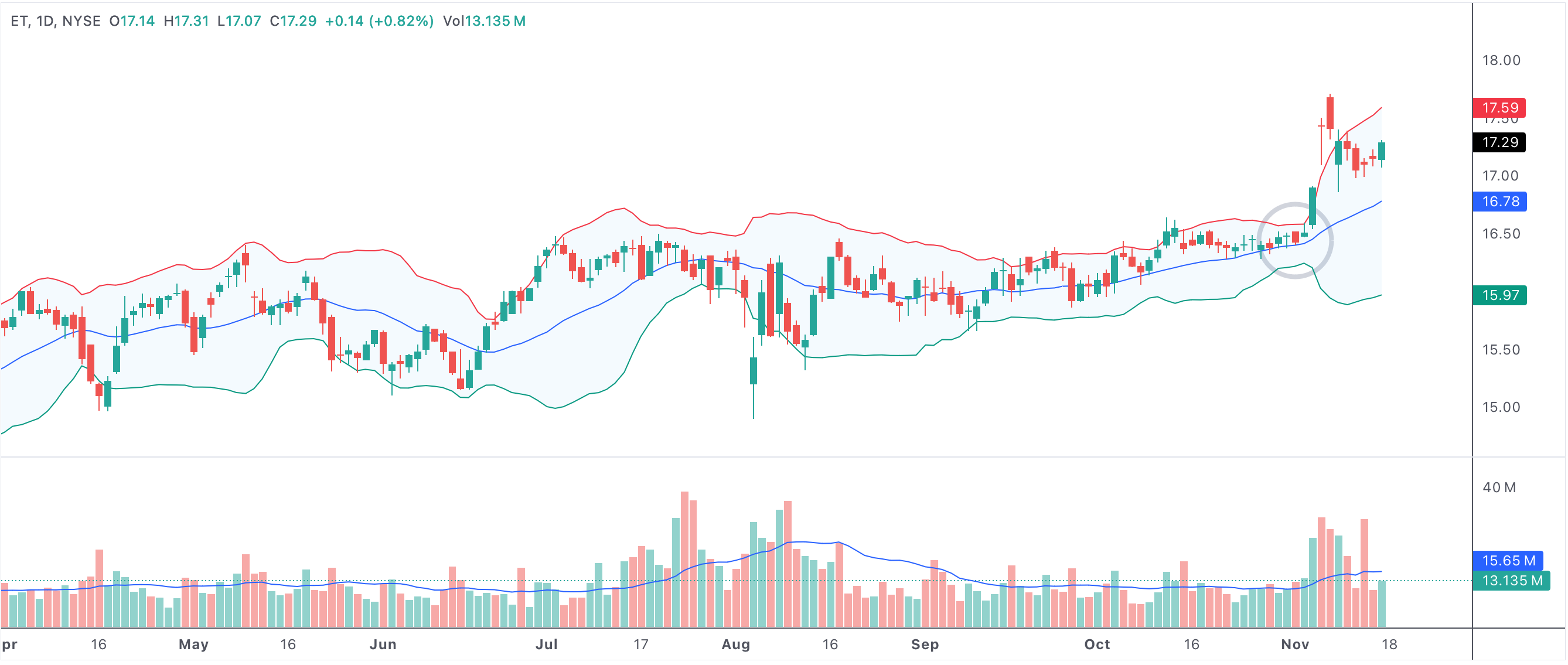Stocks in a Bollinger Band Squeeze - Spotting Breakout and Momentum Setups
The Bollinger Band squeeze is one of the most closely watched patterns in technical analysis for traders seeking explosive moves in the stock market. This setup occurs when the bands, which typically track volatility, contract to their tightest range in weeks or even months. Such low volatility often serves as a warning sign that a substantial price move—frequently a bullish breakout—could be on the horizon. Understanding how to spot and trade Bollinger Band squeezes can offer a significant edge to active traders and investors.

volatilitycontraction
Example: Stock experiencing a classic Bollinger Band squeeze with narrow bands.
A volatility contraction often signals a buildup of pressure that could lead to a significant price movement
What Is a Bollinger Band Squeeze?
Bollinger Bands are composed of a simple moving average (typically the 20-day SMA) and two bands set at standard deviations above and below this average. During normal trading, these bands expand and contract in response to price volatility. A Bollinger Band squeeze is defined by a period when the bands contract tightly together, signaling unusually low volatility and minimal price movement.
Why Do Squeezes Signal Big Breakouts?
Periods of low volatility seldom last long in the stock market. As price moves narrow and trading ranges contract, energy and pressure build up. This tension typically results in a rapid expansion, or breakout, as soon as the bands begin to widen. Many successful trading strategies are built on the premise that after a squeeze, the first move out of the bands often sets the direction for a new, powerful trend—often bullish if the breakout is to the upside.
- Low Volatility: Squeeze periods reflect uncertainty and consolidation, setting the stage for a move.
- Breakout Potential: The tighter the bands, the more dramatic the price movement often is once the squeeze resolves.
- Bullish Confirmation: If price closes above the upper band on strong volume, it often marks the start of a bullish phase.
How Traders Identify and Trade the Squeeze
Seasoned traders use Bollinger Band squeezes to spot stocks that are "coiling" before a move. Tools like visual band width analysis, volatility indicators, and price action all help identify the tightest setups. When a breakout above the upper band occurs, especially on increased volume, it’s typically viewed as a confirmation of bullish intent.
- Watch for contraction: Bands at their narrowest in weeks often signal a squeeze.
- Look for a breakout: A close above the upper band, particularly on high volume, is a classic bullish signal.
- Combine signals: The best setups often align with positive news, momentum indicators, or sector strength.
- Manage risk: Place stop losses near the lower band or recent swing lows to guard against false breakouts.
Why Squeezes Are Bullish in the Right Context
Not every squeeze results in a bullish move, but when market conditions or fundamentals are favorable, a squeeze is often the calm before the storm for buyers. Stocks breaking out of a tight range can see quick, sustained gains as traders and algorithms pile into the new trend. If the breakout is accompanied by strong volume, a surge in momentum indicators, or a broader market rally, the odds of a sustained uptrend increase substantially.
For this reason, squeezes are a favorite of both day traders and longer-term swing traders looking to catch the early stages of major moves. The low volatility period makes it easier to set tight stops, while the potential for rapid price expansion can generate attractive risk/reward setups.
Summary: Bollinger Band Squeeze as a Powerful Bullish Setup
In summary, a Bollinger Band squeeze signals low volatility and a buildup of pressure, frequently preceding explosive breakouts. When the upper band is breached, and momentum aligns, this technical setup can mark the start of a powerful bullish move. Traders who understand and capitalize on the squeeze pattern can gain early entry into strong trends and take advantage of some of the stock market’s most dynamic price action.